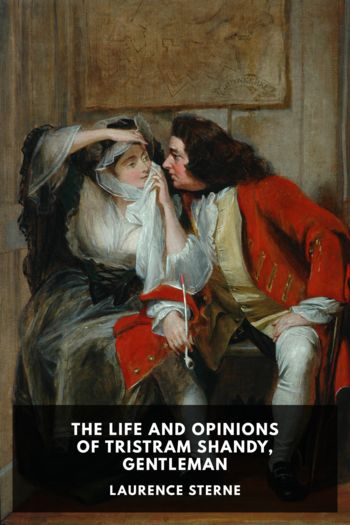The Life and Opinions of Tristram Shandy, Gentleman, Laurence Sterne [rosie project txt] 📗

- Author: Laurence Sterne
Book online «The Life and Opinions of Tristram Shandy, Gentleman, Laurence Sterne [rosie project txt] 📗». Author Laurence Sterne
⸺Did that bespeak me cruel? Or because, brother Shandy, my blood flew out into the camp, and my heart panted for war,—was it a proof it could not ache for the distresses of war too?
O brother! ’tis one thing for a soldier to gather laurels,—and ’tis another to scatter cypress.⸺[Who told thee, my dear Toby, that cypress was used by the antients on mournful occasions?]
⸺’Tis one thing, brother Shandy, for a soldier to hazard his own life—to leap first down into the trench, where he is sure to be cut in pieces:⸺’Tis one thing, from public spirit and a thirst of glory, to enter the breach the first man,—To stand in the foremost rank, and march bravely on with drums and trumpets, and colours flying about his ears:⸺’Tis one thing, I say, brother Shandy, to do this,—and ’tis another thing to reflect on the miseries of war;—to view the desolations of whole countries, and consider the intolerable fatigues and hardships which the soldier himself, the instrument who works them, is forced (for sixpence a day, if he can get it) to undergo.
Need I be told, dear Yorick, as I was by you, in Le Fever’s funeral sermon, That so soft and gentle a creature, born to love, to mercy, and kindness, as man is, was not shaped for this?⸺But why did you not add, Yorick,—if not by nature—that he is so by necessity?⸺For what is war? what is it, Yorick, when fought as ours has been, upon principles of liberty, and upon principles of honour⸺what is it, but the getting together of quiet and harmless people, with their swords in their hands, to keep the ambitious and the turbulent within bounds? And heaven is my witness, brother Shandy, that the pleasure I have taken in these things,—and that infinite delight, in particular, which has attended my sieges in my bowling-green, has arose within me, and I hope in the corporal too, from the consciousness we both had, that in carrying them on, we were answering the great ends of our creation.
XXXIIII told the Christian reader⸺I say Christian⸺hoping he is one⸺and if he is not, I am sorry for it⸺and only beg he will consider the matter with himself, and not lay the blame entirely upon this book⸺
I told him, Sir⸺for in good truth, when a man is telling a story in the strange way I do mine, he is obliged continually to be going backwards and forwards to keep all tight together in the reader’s fancy⸺which, for my own part, if I did not take heed to do more than at first, there is so much unfixed and equivocal matter starting up, with so many breaks and gaps in it,—and so little service do the stars afford, which, nevertheless, I hang up in some of the darkest passages, knowing that the world is apt to lose its way, with all the lights the sun itself at noonday can give it⸺and now you see, I am lost myself!⸻
⸺But ’tis my father’s fault; and whenever my brains come to be dissected, you will perceive, without spectacles, that he has left a large uneven thread, as you sometimes see in an unsaleable piece of cambrick, running along the whole length of the web, and so untowardly, you cannot so much as cut out a * *, (here I hang up a couple of lights again)⸺or a fillet, or a thumbstall, but it is seen or felt.⸻
Quanto id diligentius in liberis procreandis cavendum, sayeth Cardan. All which being considered, and that you see ’tis morally impracticable for me to wind this round to where I set out⸻
I begin the chapter over again.
XXXIVI told the Christian reader in the beginning of the chapter which preceded my uncle Toby’s apologetical oration,—though in a different trope from what I should make use of now, That the peace of Utrecht was within an ace of creating the same shyness betwixt my uncle Toby and his hobbyhorse, as it did betwixt the queen and the rest of the confederating powers.
There is an indignant way in which a man sometimes dismounts his horse, which as good as says to him, “I’ll go afoot, Sir, all the days of my life, before I would ride a single mile upon your back again.” Now my uncle Toby could not be said to dismount his horse in this manner; for in strictness of language, he could not be said to dismount his horse at all⸺his horse rather flung him⸺and somewhat viciously, which made my uncle Toby take it ten times more unkindly. Let this matter be settled by state-jockies as they like.⸺It created, I say, a sort of shyness betwixt my uncle Toby and his hobbyhorse.⸺He had no occasion for him from the month of March to November, which was the summer after the articles were signed, except it was now and then to take a short ride out, just to see that the fortifications and harbour of Dunkirk were demolished, according to stipulation.
The French were so backwards all that summer in setting about that affair, and Monsieur Tugghe, the Deputy from the magistrates of Dunkirk, presented





Comments (0)